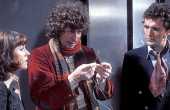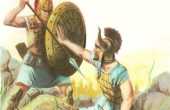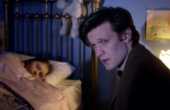Burke
I'm a senior at Case Western Reserve with an interest in Doctor Who and a passion for Latin.
Junior Contributor III
- Plebian Penman
- Lurker
- Pssst
- ?
- Articles
4 - Featured
1 - Comments
28
- Ext. Comments
19 - Processed
1 - Revisions
1
- Topics
0 - Topics Taken
0 - Notes
0
- Topics Proc.
0 - Topics Rev.
0
- Points
390 - Rank
X - Score
195
Latest Articles
Latest Comments
| The Aeneid and Battlestar Galactica: Exploring Intertext | |
I personally never noticed a Satanist subtext, but it would make an interesting reading. I’m not sure about the Joker as God though – especially because he was going to blow up a boat when they didn’t blow each other up. | The Dark Knight Rises: In Defense of the Plot Twist |
Great article! I had no idea about this movie until now. | Batman Vs. Superman: 3 Things that can Save the Film |
I really like your point about too much of a good thing. I mean, I love Community and I didn’t feel like it started to grow flat (barring maybe the season finale, but I even enjoyed that). In fact, if they made a season 6, I think they’d have the energy to make it work. But I hate saying things like, “I like the Simpson – but before season 11,” or “I like Psych – but before season 5,” so I suppose that Community was cancelled prematurely has a silver lining. | A Look Back on Community: The Little Show That Could |
Agreed, but don’t you think that’s of some interest when the morals come out entirely different? I mean, two works with similar plot lines and entirely different conclusions – I think that’s grounds for an intertextual analysis. At the very least, it might tell us something about Roman culture in comparison to ours. Unfortunately, I glossed over some of these ideas because I was more interested in reversing the order of intertext, but I still feel there would be sufficient grounds to read the Aeneid as inspiration for BSG (and not just the other way around). | The Aeneid and Battlestar Galactica: Exploring Intertext |
Also, I feel like the use of Greek gods might have relevance to an interpretation dealing with the spread of Christianity, since the Cylons worship a monotheistic Juedeo-Christian God. I haven’t exactly figured that one out yet. | The Aeneid and Battlestar Galactica: Exploring Intertext |
I’d also advise paying particular attention to when the Doctor is captured or caught in a lie since those are some of the finest moments. For example, here is an episode where he arrives on a planet and quickly discovers he matches the description for that planets devil: https://www.youtube.com/watch?v=geMx6y8ctFk | The Doctor and Omega: Intertext in Moffat's "The Big Bang" |
The old series has very few story arcs. And the overarching story usually doesn’t have terribly much influence on the individual stories. Yes, there is a time lord lore, and you could watch a very specific track of episodes to understand all that. And there is Dalek lore, and you could watch certain episodes to better understand that. But the lore can be understood out of order because you get the original information out of order because it’s a show about time travel and because they don’t really count on you to have watched the whole thing. Sometimes the companions have more depth in their history – for example, Romana changes from someone who does not get along with the Doctor to someone who is the perfect counterpart to all his madness and genius. Personally, I think you can pick up any story in the Classic series and understand it just fine, so long as it is not part of one of the rare story arcs (Key to Time, Espace Trilogy, Black Gaurdian Trilogy, etc.), but even those are fairly straight forward and contain mostly individualized stories. If you want to be cautious, maybe you could start with the beginning of a companion. If you wanted to start when a companion starts, I’d recommend Romana Mark I, who’s an unpopular choice but is part of one of the rare story arcs and who reminds me a lot of River Song (you’d begin with Season 16, which is the Key to Time story arc) and whom I really think is hilarious. I wouldn’t start with the first Doctor, though, because a lot of the stuff is lost and they only have the audio. I tried to sit through some audio episodes, but I found it very painful. That’s me, and I know people who are very dedicated fans who did exactly what you described – began with the first Doctor and worked there way up – but I see the original series as extremely episodic and content to be episodic. | The Doctor and Omega: Intertext in Moffat's "The Big Bang" |




Thank you for your thoughtful response! I’m a little embarrassed because I wrote this analysis before studying or even having an understanding of the Death of the Author or the ideas surrounding it. As such, my argument assumes that there is a single, objective meaning to a text when it would be better served by arguing that each readers interpretation is equally valid. Nevertheless, you respond well both to what I said and what I should’ve said. I will have to read Irwin’s article. I also appreciate the time you take to address the deaths of Turnus and Dido. I suppose my own bias for an optimistic reading is apparent – I am borrowing ideas from primarily optimistic articles in that section. I hope to leave a more thorough response soon, but I’m currently in the middle of testing season, so I hope you’ll forgive me if I take some time